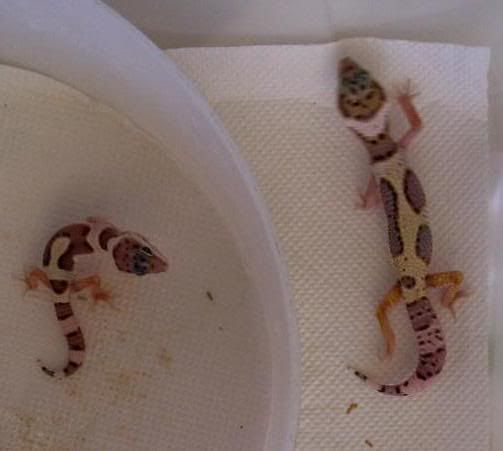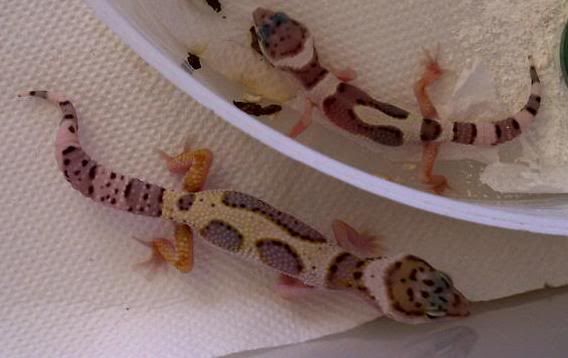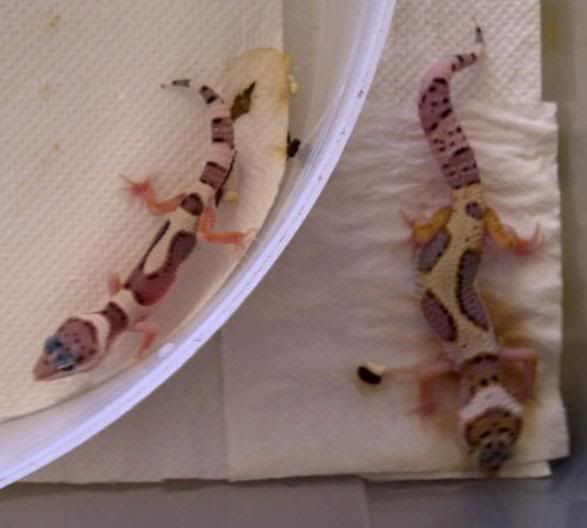Saskia
New member
Good day!!
I have had geckos for 9 years (only leos), and I have been breeding them for the past 3 years, succesfully hatching a few dozen babies.... For food I do this:
During the first one or two months I feed them small mealworms, because they are easier for the gecko to eat, I always feed on a dish, properly dusted mealworms, and I believe I do gutload my mealworms... why? because their bedding is cat food, not bran as most people use, anyways, I also breed roaches which I use to feed the juveniles and adults, I also have a big back yard where I collect grasshoppers/locusts almost every day to provide more variety to my geckos, I also use calcium (with and without D3), they have UTH, paper towels as a substrate, etc etc, I have been very lucky so far, the only gecko I have had sick was an adopted one that was sick when I got him... all my babies have been very healthy, and are all alive, fat and gorgeous!... anyways, as always there are some picky eaters, this year I have 2 babies that have caught my attention...
I have read a lot of information regarding mealworms, and why they are a bad staple diet, in fact that's why I started breeding roaches, anyways, this year the last 2 eggs I hatched were 2 beautiful geckos when they were born, I always weight my geckos when they hatch, they both hatched on july 23rd weighing 3 grames, the eggs had been incubating together for 51 days... I usually house siblings together the first few weeks, and this time it was no exception, I bought a new tupper, 14 gallon for both babies, because their big brothers were too big to house them with, so, I bought a new container just for the 2 of them...
When they had been together for 10-11 days I noticed that one of the babies was significantly larger than the other one, one was still 3 grames and the other was nearly 6!! I thaught that the big baby was bullying the other one and not allowing him to eat, and therefor I separated them, bought another tupper, a 10 gall. and separated them, they have been housed alone ever since...
I started puting small mealworms in a dish for both babies separately, and a couple days later when cleaning the small babies's tank I found all the mealworms hiding under the paper towel! He wasn't eating! I got nervous but immediately tried a different feeder, I offered very small grasshoppers, amputating their back legs so the tiny baby could catch them, he immediately ate, so, I figured he didn't like mealworms...
From that day on I have given him 4-6 small-medium sized grasshoppers every day, I catch the grasshoppers from the garden, cut the back legs and the antenas and feed him that, I also have fed a few roaches, but he doesn't seem to like them just as much... the big brother has been on a staple mealworm diet, with an ocasional (less than once a week) grasshopper meal.
They are getting close to 2 months now..... the small baby is still very small!! I weight them yesterday, the baby that has been eating grasshoppers and roaches is 4,5 grames!, the baby that has been eating mealworms is 12 grames!
I understand that according to studies mealworms are not a good diet, but how is it possible that a mealworm eating baby is so big and healthy looking and a grasshopper-roach eating baby is not growing??? I mean, let's leave studies aside for a minute and let's talk about our personal experiences, this does it for me, I don't know what to think now about the so "terrible" mealworms... :? I'll take pictures right now so you can see the big size difference, and the ONLY difference between is food, they are clutchmates, same mom and dad, similar housing.... hatched same day...
Anyone care to give an opinion???
I have had geckos for 9 years (only leos), and I have been breeding them for the past 3 years, succesfully hatching a few dozen babies.... For food I do this:
During the first one or two months I feed them small mealworms, because they are easier for the gecko to eat, I always feed on a dish, properly dusted mealworms, and I believe I do gutload my mealworms... why? because their bedding is cat food, not bran as most people use, anyways, I also breed roaches which I use to feed the juveniles and adults, I also have a big back yard where I collect grasshoppers/locusts almost every day to provide more variety to my geckos, I also use calcium (with and without D3), they have UTH, paper towels as a substrate, etc etc, I have been very lucky so far, the only gecko I have had sick was an adopted one that was sick when I got him... all my babies have been very healthy, and are all alive, fat and gorgeous!... anyways, as always there are some picky eaters, this year I have 2 babies that have caught my attention...
I have read a lot of information regarding mealworms, and why they are a bad staple diet, in fact that's why I started breeding roaches, anyways, this year the last 2 eggs I hatched were 2 beautiful geckos when they were born, I always weight my geckos when they hatch, they both hatched on july 23rd weighing 3 grames, the eggs had been incubating together for 51 days... I usually house siblings together the first few weeks, and this time it was no exception, I bought a new tupper, 14 gallon for both babies, because their big brothers were too big to house them with, so, I bought a new container just for the 2 of them...
When they had been together for 10-11 days I noticed that one of the babies was significantly larger than the other one, one was still 3 grames and the other was nearly 6!! I thaught that the big baby was bullying the other one and not allowing him to eat, and therefor I separated them, bought another tupper, a 10 gall. and separated them, they have been housed alone ever since...
I started puting small mealworms in a dish for both babies separately, and a couple days later when cleaning the small babies's tank I found all the mealworms hiding under the paper towel! He wasn't eating! I got nervous but immediately tried a different feeder, I offered very small grasshoppers, amputating their back legs so the tiny baby could catch them, he immediately ate, so, I figured he didn't like mealworms...
From that day on I have given him 4-6 small-medium sized grasshoppers every day, I catch the grasshoppers from the garden, cut the back legs and the antenas and feed him that, I also have fed a few roaches, but he doesn't seem to like them just as much... the big brother has been on a staple mealworm diet, with an ocasional (less than once a week) grasshopper meal.
They are getting close to 2 months now..... the small baby is still very small!! I weight them yesterday, the baby that has been eating grasshoppers and roaches is 4,5 grames!, the baby that has been eating mealworms is 12 grames!
I understand that according to studies mealworms are not a good diet, but how is it possible that a mealworm eating baby is so big and healthy looking and a grasshopper-roach eating baby is not growing??? I mean, let's leave studies aside for a minute and let's talk about our personal experiences, this does it for me, I don't know what to think now about the so "terrible" mealworms... :? I'll take pictures right now so you can see the big size difference, and the ONLY difference between is food, they are clutchmates, same mom and dad, similar housing.... hatched same day...
Anyone care to give an opinion???




